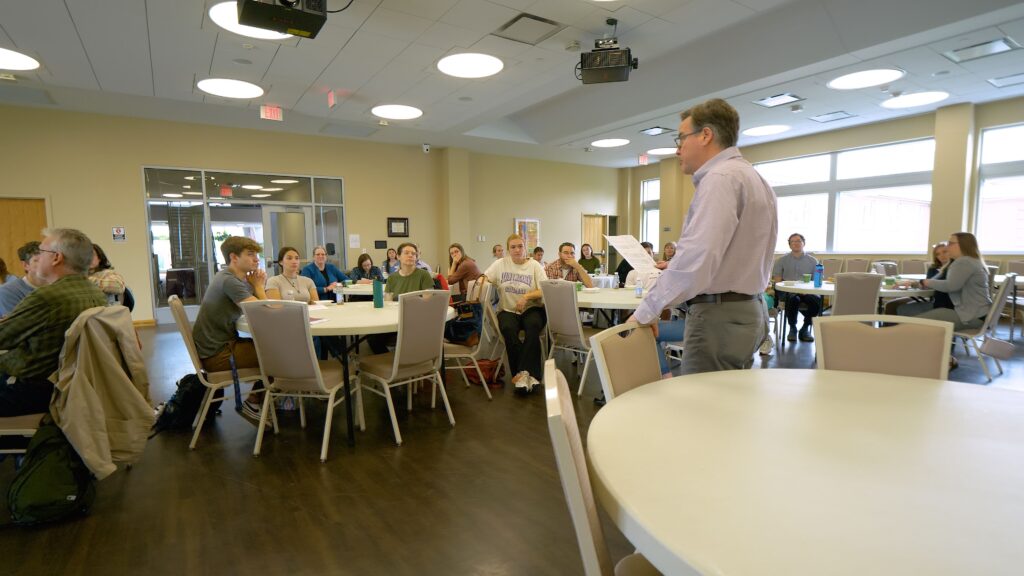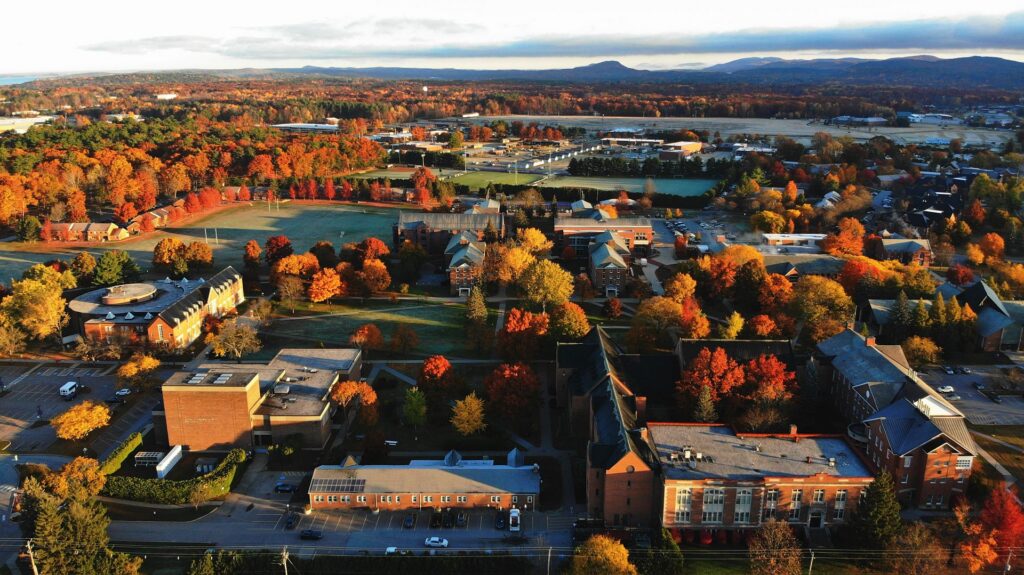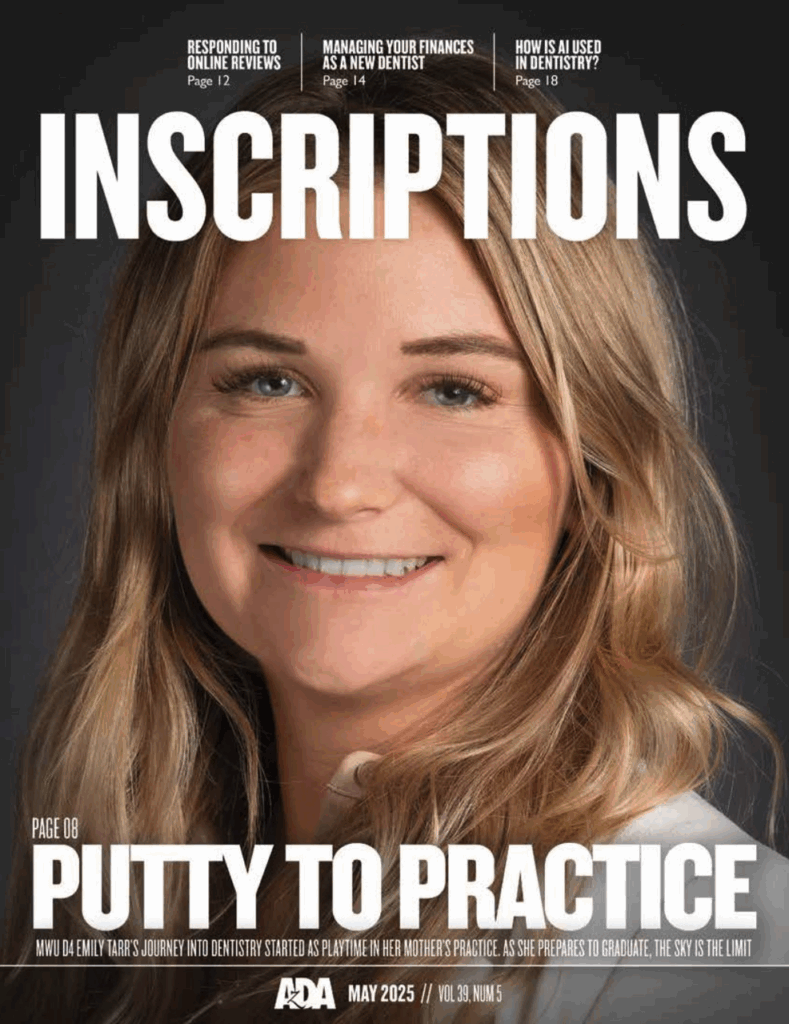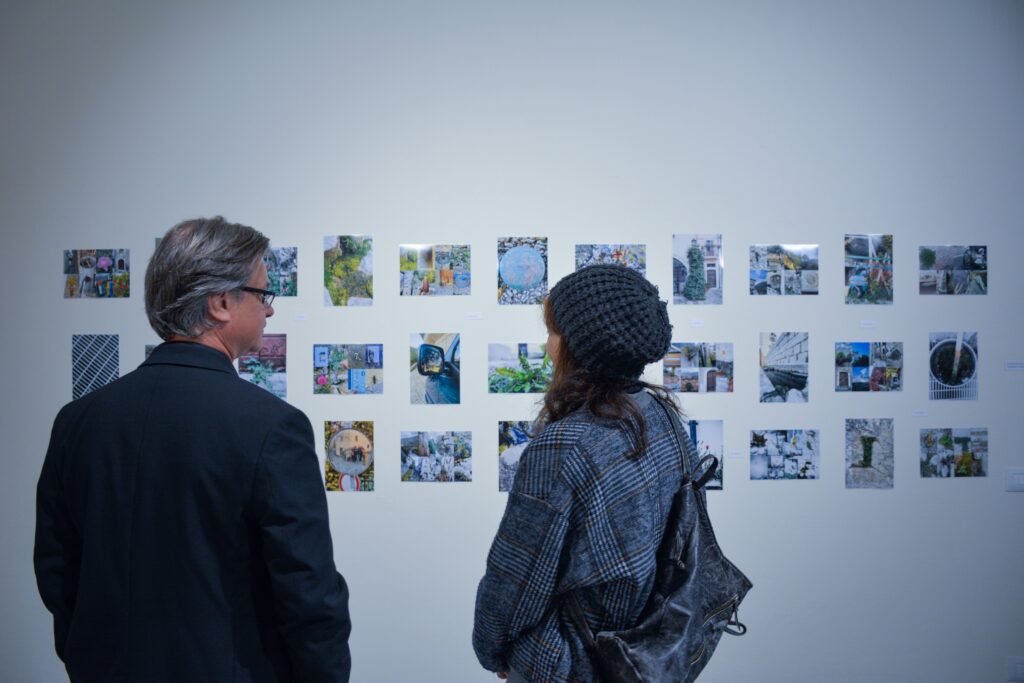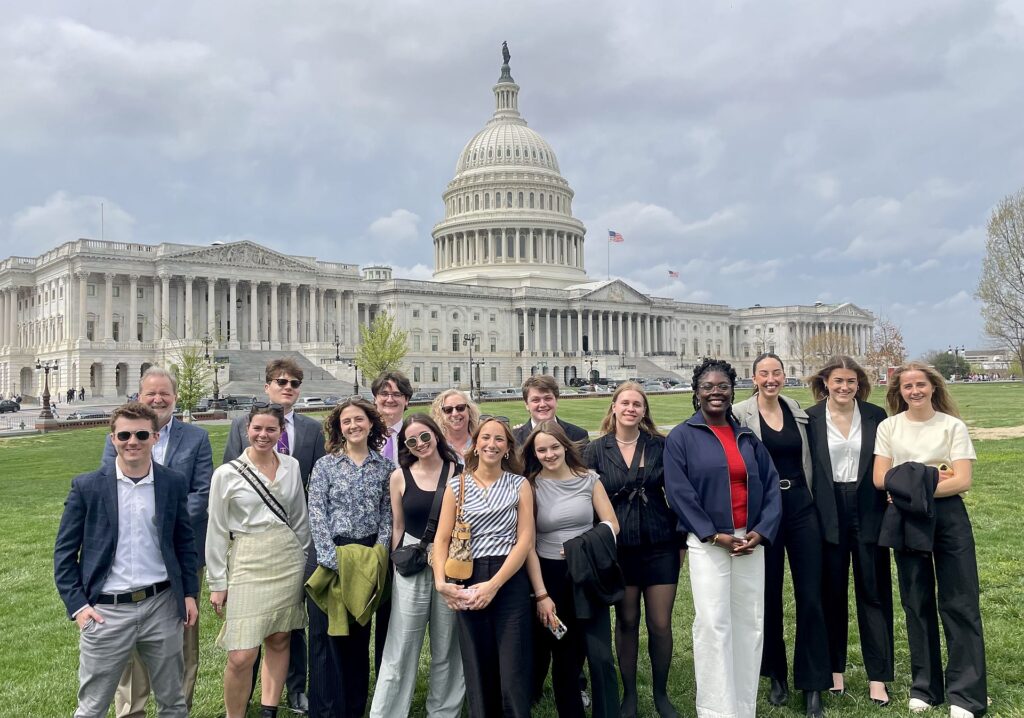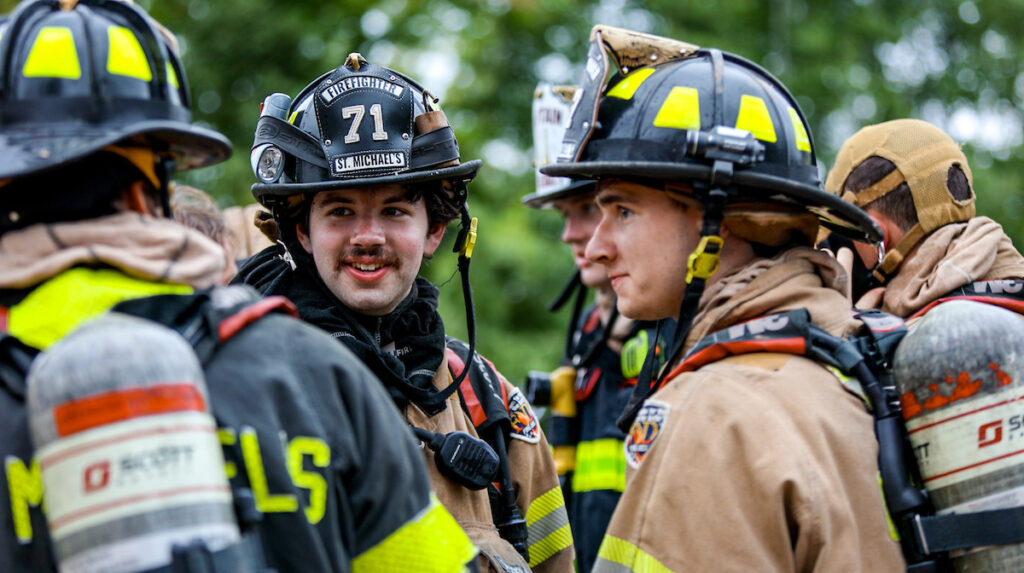Students conducting summer research with Saint Michael’s faculty members kicked off their projects this month by sharing some of the goals for their research during a breakfast gathering together on campus.
The June 7 event marked the beginning of a busy few months for students and faculty mentors who have been awarded grants through the College’s Academic Affairs office. They will gather again as a group in late July to share findings and experiences from their work, and each student will have to present on that research sometime over the next academic year. Some students who had obtained grants through other means (such as the Vermont Biomedical Research Network and NASA) also attended the breakfast.
Vice President for Academic Affairs Jeff Trumbower said he hopes that by having the researchers gather semi-regularly, this will help create a “community of scholars” at Saint Michael’s. He estimated that his office has been funding student-faculty summer research on campus for about two decades.
Below is a list of the research projects being conducted on campus this summer.
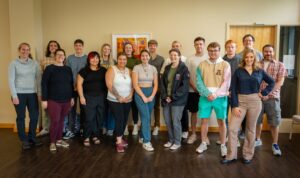
Students participating in summer research during summer 2023 pose with some of the faculty mentors during a kickoff breakfast event on June 7. (Photos by Patrick Bohan)
Emma Anderson ’25: Transcribing an 18th Century Life: Catharine Flood McCall, Business, and Slavery in Early Virginia
Faculty mentor: Professor Alexandra Garrett, History Department
Anderson will help provide the foundation for a chapter in Professor Garrett’s current book manuscript, Catharine Flood McCall’s Virginia: Gender, Slavery, and Manufacturing at the Turn of the Nineteenth Century. Anderson’s work will involve transcribing over 1,000 pages of an early 1800s lawsuit and court case involving a Virginia businesswoman and her creditors – which was written by early Americans in cursive. Through this work, she will engage with primary legal documents in a case that no other historian has examined and learn the basics of early American spellings and abbreviations. This will also help Professor Garrett in examining how early Virginian legal systems treated women in debt cases.
Aaron Bouchard ’24: Quantitative Analysis of PAH Levels Across New York State: A Longitudinal Study
Lily O’Connell ’24: Quantitative Analysis of PAHs and Heavy Metals in Lake Champlain
Faculty mentor: Professor Christina Chant, Chemistry Department
Bouchard will be looking at contaminants (specifically polycyclic aromatic hydrocarbons, or PAHs) in Lake Champlain and several bodies of water in New York. With growth of both industries and infrastructure near the Lake Champlain basis over the past few decades, some scientists have hypothesized that the levels of PAHs have grown. Bouchard plans to take both water and soil samples near the Vermont and New York bodies of water to measure just how contaminated with PAHs the areas are. This is a continuation of research Bouchard began last summer.
O’Connell will look at making the process of measuring contamination a bit more “green,” with focus on the Vermont side of Lake Champlain and the Winooski River. She plans to use substances like eucalyptus oil to draw out PAH compounds, which is less expensive, uses less waste, and is more eco-friendly than the typical extraction method that uses acetone.
Celia Durgan ’24: Use of Metaphors and Visual Art Among Bloggers with Chronic Pain: A Content Analysis
Faculty mentor: Professor Sarah Nosek, Psychology Department
Professor Nosek has been conducting research on the potential for people with chronic pain to use expressive writing to help them process, describe and cope with their experiences. Durgin will dive further into several aspects of that research by analyzing chronic pain blogs for patterns of metaphor/language and art use. Durgin is interested in art therapy, so the goal of this research is to better understand how people with chronic pain communicate about those challenges and attempts to cope with the pain.
Kaitlyn Folsom ’24: Easily Overlooked: An assessment of how the state of Vermont supported individuals with ASD during the COVID-19 pandemic.
Faculty mentor: Professor Trish Siplon, Political Science Department and Public Health Program
Folsom will look at the ways in which the state of Vermont tried to support individuals with Autism Spectrum Disorder (ASD) during the COVID-19 pandemic. She aims to explore whether people with ASD felt that Vermont provided adequate accommodations and support during the pandemic years and how they have experienced any support efforts.
Adison Granger ’24: The Rise of Christian Nationalism in the United States and its Implications for Society
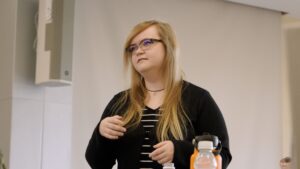
Adison Granger ’24 describes a summer research project on June 7, 2023, during the summer research kickoff breakfast.
Faculty mentor: Professor James Byrne, Religious Studies Department
Granger will examine the rise of Christian nationalism and its implications in different aspects of society – including in politics, racial equality, public health, religious freedom and other areas. Current research has indicated that Christian nationalism (which also encompasses some anti-Semitic groups) has many negative impacts. Along with exploring these impacts, Granger hopes to make a prediction as to what could happen to the U.S. if Christian nationalism continues to grow and is unchallenged.
Jamie Hearn ’26: Development of a novel, non-invasive, early-warning diagnostic for insulin resistance
Jonathon ”Jack” Macdonald ’25 and Jack Conroy ’24: Characterizing the insulin-sensitizing bioacitivities of Vanilloids in model human liver cells
Faculty mentor: Professor Christopher Dieni, Chemistry Department
Hearn, Conroy and Macdonald will work on different aspects of research into insulin resistance – a project that Professor Dieni has been conducting for a number of years.
Hearn will be looking at ways to create an early detection test for insulin resistance that is affordable, reliable and minimally invasive. According to Hearn’s project abstract, early diagnostics have strong potential to help patients adapt to life with diseases caused by insulin resistance – or in best cases, undergo preventative management to lessen the severity of the disease or avoid it altogether.
Macdonald and Conroy will be looking at the interventive side of insulin resistance – specifically, novel insulin sensitizers and other therapeutic measures used to reverse insulin resistance. They will be focusing on what is commonly known as the “capsaicin receptor” – after the hot ingredient in chili peppers – to determine what, if any, therapeutic potential this receptor has in reversing insulin resistance.
Anna Juarez ’23: Does incorporating wastewater pre-treatment methods into Vermont brewers improve their effluent water quality?
Faculty mentor: Professor Clay Williams, Environmental Studies and Science Department
Juarez will be looking at the impact of Vermont breweries – and the wastewater created as a result of brewing beer – on wastewater treatment and management systems and aquatic ecosystems. As part of this, Juarez will work to understand the different permits that regulate the waste byproduct, called effluent, and the steps that breweries in Vermont might take to ensure a cleaner byproduct that is less likely to contaminate lakes and rivers.
Colby Fane-Cushing ’25: The Integration of EEG Biofeedback into Virtual Reality-Delivered Meditation
Faculty mentors: Professor Melissa VanderKaay Tomasulo, Psychology Department, and Professor Dagan Loisel, Biology Department
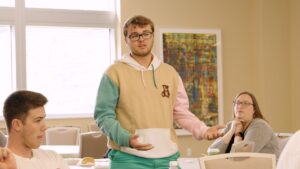
Colby Fane-Cushing ’25 describes his continued research funded by NASA on June 7, 2023.
Fane-Cushing will continue research funded by NASA’s Space Grant College and Fellowship Program. Last year, he and a group of student researchers looked at whether virtual reality-delivered meditation impacted a person’s anxiety and stress levels as compared with non-virtual reality-delivered meditation. Several measures were used to show the effects, including saliva samples of the subjects and their heart rates. This year, Fane-Cushing plans to use EEG biofeedback to monitor people’s brain waves while engaging in meditation and provide further data as to whether virtual reality-delivered meditation is more effective. The results could impact the ways that astronauts manage their stress levels while in space.
Helene Kristoffersen ’25: Determining the effect of a mutation on subcellular location of moesin and migratory ability in Jurkat T cells
Olivia Stebbins ’24: Evaluating the Molecular Effects of the X-MAID Muttion on Moesin in T Cells
Faculty mentor: Professor Lindsay Avery, Biology Department
Both Kristoffersen and Stebbins are examining different aspects of the protein moesin in T cells, a type of white blood cell, and how these cells mutate to cause a rare disease, X-linked moesin associated immunodeficiency (X-MAID).
Kristoffersen is looking at the cellular basis for X-MAID. Patients who suffer from X-MAID often develop recurrent infections and succumb to the disease early in life. The only treatment currently available for X-MAID is bone marrow transplant. She is hoping to understand X-MAID at a more basic level.
Stebbins is continuing research she started last summer and worked on throughout the last academic year. She is hoping to compare phosphorylation levels of normal T-cells with the mutated cells found in people who suffer from X-MAID.
Erin Madden ’24: Feminist and Queer Geography – Examining the Counterculture of Communal Living in and Around Vermont from 1970s – the present.
Faculty mentor: Professor Nat Lewis, English Department
Madden will look at how the constructions of gender and sexual identities impact spaces and places, using queer, environmental, and political theory to study women’s land collectives from the 1970s to the present, primarily in Vermont. Madden hopes this research will illuminate how women interact with and shape the spaces they inhabit — and the ways those spaces also shape them.
Sophia Meimaris ’24: Inside Sebald: A Creative Exploration of History and Aesthetics
Faculty mentor: Professor Nat Lewis, English Department
Meimaris seeks to understand the literary, historical, and aesthetic complexities present in W. G. Sebald’s novels. She will analyze elements of the novels to break down the author’s understanding of the human experience – and even adopt his writing style to deepen her textual and thematic understandings of his books. Themes she will explore include historiography and literature, fact and fiction, and aesthetics and memory.
Dayna Mieles ’24: The generality of efflux pump-mediated gentamicin collateral sensitivity in Escherichia coli
Faculty mentor: Professor Nicole Podnecky, Biology Department
Mieles will be looking at ways to reduce humans’ selection for and transmission of antimicrobial resistance (AMR), which is one of the greatest risks to public health today and is commonly caused by E. coli. Her research centers on whether pairs of antimicrobial agents – where resistance development to one agent can result in sensitivity to another – can be used either sequentially or in combination with drug cycling regimens to reduce AMR selection and fixation.
Magnolia Sinisi ’24: Expressing art & humanities through web design
Faculty mentor: Professor Becca Gurney, Fine Arts Department
Sinisi will be designing two websites, including one to promote a new book by Saint Michael’s Sociology and Anthropology Professor Adrie Kusserow. Sinisi has been exploring how to integrate her analog art-making into digital presentation – creating digital based designs that have a familiar, human quality. She’ll be learning two different web platforms and exploring how to bring the qualities of being human into web design.
Jarrett Sweet ’25: Transphobia and Homophobia: Impact on the Academic Performance of LGBTQIA+ Students
Faculty mentor: Professor Mike Bosia, Political Science Department
Sweet will be surveying LGBTQIA+ youth who attend school in Vermont as well as faculty and staff to determine the ways a student’s LGBTQIA+ identity might affect their learning. Sweet plans to analyze if location matters in these experiences and outcomes, with a focus on rural versus urban, and what influence of the child’s community type might be. The project’s findings will be reported to LGBTQIA+ non-profit organizations to enable the development of new initiatives and resources in Vermont, and they will be shared with the districts participating, the LGBTQIA+ students and their parents.
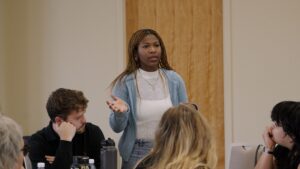
Dakota Thomas ’24 describes her summer research project on June 7, 2023.
Dakota Thomas ’24: Interpreting Constructs: A Phenomenology of Race
Faculty mentor: Professor Katie Kirby, Philosophy and Ethics Department
Thomas will look at how the idea of race exists in society and affects humans’ values. She will study the construct of race through history and philosophy to point to specific examples of how or why race had an impact on events, ideas, or values.
Addison Wessinger ’24: Ecological Health Comparisons Between Old Growth Stand and Natural Area
Faculty mentor: Professor Clay Williams, Environmental Studies and Science Department
Among those working to mitigate the impact of climate change and the extinction crisis, one consistent talking point has been how protecting forests and allowing them to reach old-growth status can be beneficial. Wessinger plans to compare a plot of land in the Saint Michael’s College Natural Area – which has been impacted by humans – to a plot of old growth forest nearby, which has not been touched by humans. He hopes to show whether old-growth forests have healthier soils and biodiversity indicators than ecosystems with a more recent history of human disturbance.

For all press inquiries contact Elizabeth Murray, Associate Director of Communications at Saint Michael's College.
